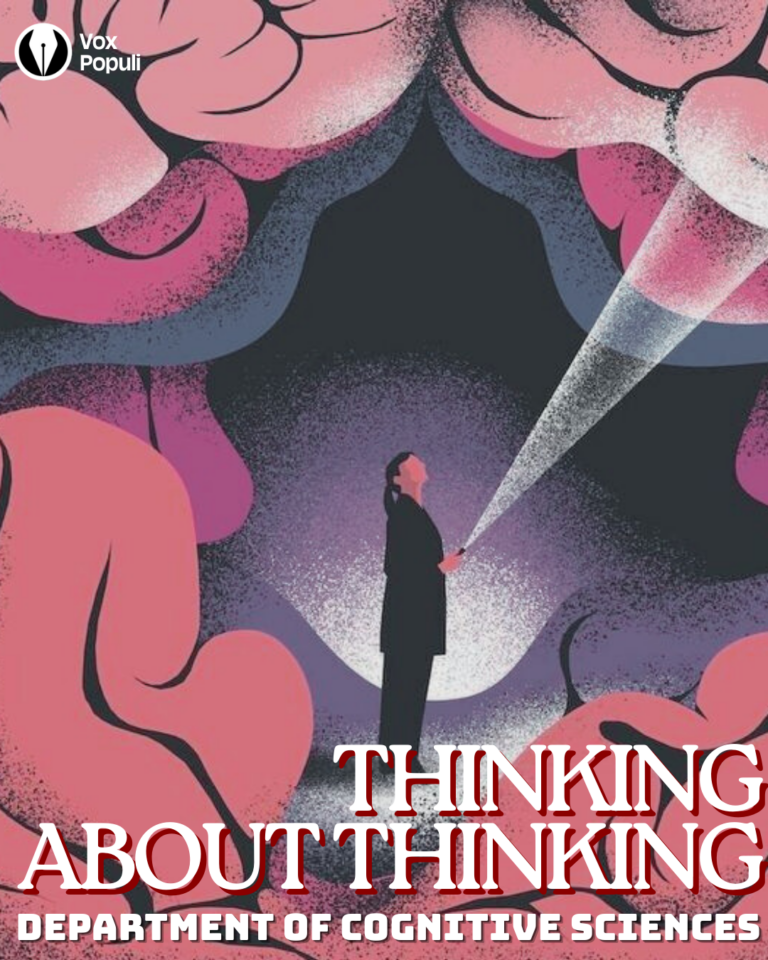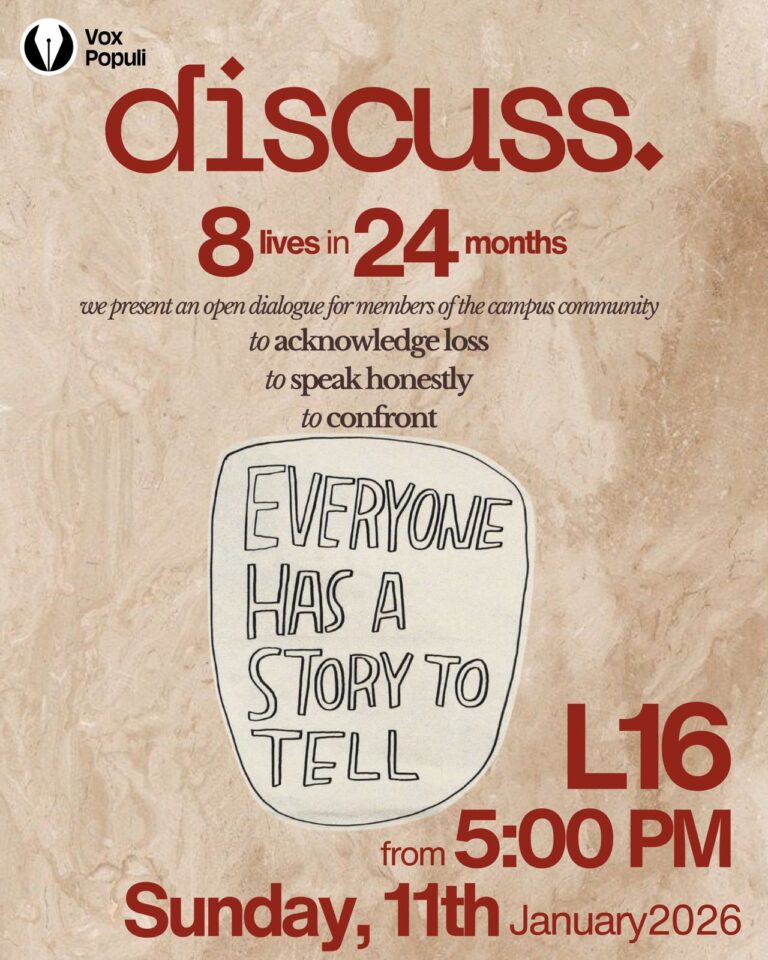In the past ten years, the stigma associated with mental health concerns has decreased significantly in our society. People are becoming more at ease discussing it, looking for assistance, finding solutions, and battling stigmatisation on a global scale throughout time. Naturally, the situation on our campus has improved as well. In terms of de-stigmatising mental health conditions, we have come a long way and achieved significant progress. Despite this, we have not yet found our happily ever after.
Talking to some of the core team members from the counselling service, the Vox team realised that a layer of stigma still clouds the bright minds of our institute. We have a wide range of bottlenecks in the process, from the initial reluctance to seek treatment to combating societal judgement. This Mental Health Day, let us work together to take a step forward and strive to remove these impediments.
What follows is a list of questions that we compiled on mental health and its surrounding stigmas, answered by a few professionals from the counselling service, core team members, and a few students who were willing to open up to us about it. Wishing you all a fun read, and a Happy Mental Health Day!
Q. What are the common problems that our campus community encounters?
The counselling service caters to over 1000 cases per year. Academic stress, mood disorders, emotional problems, traumas, depression, anxiety, poor coping skills, addiction issues and sleep disturbances are a few of the causes. More than often, it’s an amalgamation of several issues. The same causes can range in intensity depending on one’s emotional vulnerabilities. In other words, while exam stress can be easily managed for some students, it may also act as a trigger for others. A CS counsellor remarked, “Students sometimes just want to chat about what’s going on in their lives and see if they have a problem. At times, when students are unable to cope with immediate stressors like exams or breakups, they ask for single-session-therapies (SSTs), in which they come for one session to talk about their concerns.”
There were also a few instances where students could not adapt to the change in environment when they come to campus. A lot of students approached CS in recent times due to the inability to adapt to the offline shift of academics.
Living alone in a different environment, that too after being cooped up for over 2-3 years was tougher than I expected
Another counsellor told us – “Most of the students here were a few of the smartest students in their schools. Many new students struggle with feeling uneasy about not being the sharpest person in the class when they first arrive.”
Q. When are cases referred to external psychiatrists?
There is a difference between a counsellor, a therapist and a psychiatrist. A therapist is a licensed psychologist who uses different therapies and Behaviour modification techniques to treat mental health symptoms. A psychiatrist is a medical doctor who can diagnose and prescribe drugs to treat mental health disorders. Counsellors in CS are professional and licensed therapists, they offer different kinds of help depending on the need/trauma faced by the student in their lives.
“Not every case that contacts CS is referred to external psychiatrists. Even then, not every patient that is referred outside requires medication.”
Q. What kind of stigma still surrounds mental health on our campus today?
I just had to hit rock bottom to realise that I needed help.
Most students are reluctant to ask for help. Some might feel that they can solve the problems independently, and some might be embarrassed to seek help. A few students hesitate because they fear being judged by society, their parents or their friends. We saw a magnified version of this when it came to medication.
“We strongly promote medical treatment whenever it is necessary. But we cannot enforce it upon someone.” said the counselling service. “We provide psychological education to the students regarding their mental health conditions and let them make the final call. Not their parents, not their peers, not us, just them.”
“ I knew that something was wrong for a very long time,” a student told Vox, “but generally in society, you have this notion that you can work on this on your own. If you get up at 6 AM and run, your life will get better. “
It was seen that in most cases, initially there was a lot of hesitation to take meds.
However, after a few counselling sessions, students seemed to get more comfortable with medication. “The problem with taking drugs is that students are afraid of getting addicted to them or being dependent on them. They feel that it is a lifelong treatment or that if they stop taking their medicines, they will repeat the same cycle of problems.” the CS told us.
Q. What is the exact procedure for prescribing medical care?
When it comes to drugs, the professionals take into account your body requirements, diet, exercise, genetic vulnerability and medical history before they recommend the required medicines. They also check for family history. The course usually starts with a small dosage, to see if it’s working and if there are any side effects, and then the dosage is slowly increased.
It takes a couple of weeks for the medicine to understand your body and work accordingly.
A student remarked – “I feel that it’s very scary to take medication because it feels like you’re meddling with your brain. In the beginning, I felt a little bit of a high whenever I took the meds because my mind knew something was wrong but my brain felt happy. It took me a couple of weeks for it to work.”
“One important thing to note,” a counsellor said, “is that students should try not to abruptly stop the medication or change its course without an actual medical consultation. The course is tailored in such a way that the dosage is slowly tapered off and not stopped abruptly.”
Q. Do medicines induce sleep?
All medication does not induce sleep. In the initial days, some students might feel a little drowsy. “A lot of body factors are taken into account before prescribing any drugs. So we would suggest not to worry too much about the side effects.” said the CS.
Q. If I start taking medical treatment, is it a lifelong commitment?
The duration for which a patient has to take medicines varies depending on their case. “For most cases where a student was well adjusted before coming to IIT and has no major history of psychiatric illness in the family, the medications are not lifelong at all. For such students combination of medication and psychotherapy works best.” The sooner the problem is detected, the better the prognosis. The dosage and its effects are influenced by a person’s genes, coping mechanisms, any ongoing drugs, and the frequency of the dosage.
“Medication requires patience. For someone, it can take 2 weeks to see the outcome. Someone could need twice the dosage and still not see the results after a month. Follow up are made at the discretion of the psychiatrist.”
Q. What medicines are usually prescribed?
The drugs that are usually given are anti-anxiety meds, anti-depressants, mood stabilizers, and antipsychotics. Interestingly, the meds don’t differ much, but different amounts of the same drugs can help with different mental health conditions. Sometimes different combinations of drugs are prescribed as per the variation of cases.
Q. How do I know when to stop taking medicines?
Medication should only be stopped when prescribed by psychiatrists. “At times, people stop taking their meds when they start feeling good, as they don’t feel the need for the meds anymore. They also give up if they see no change after a couple of days, and then they stop taking medicines. This is strongly unadvised.”
Q. Are parents informed about my case if I contact the counselling service?
“Parents are not always informed in case of medication, only in serious or extreme cases.” the CS told us. “We assure full confidentiality at all times, however, if a student has to be admitted to an external hospital, or if the case is severe, then the patient’s family is informed.”
Q. What can we do to tackle this issue?
A student told us – “Throughout this whole process, you face a lot of bottlenecks. When you’re having your good days it’s hard to see that you need help. When your sessions don’t go good, you feel like quitting. At times you feel that you can solve the problems on your own, or at times you’re just too preoccupied to even think about such things. But you have to take that leap of faith. Asking for help, seeking therapy/counselling, and taking medication if necessary is the only way to go about it. Anything else will just be temporary.”
“It has to come from within. No one can push you to take these steps.” another student said.
The Counselling service stated that they had a few ideas – “We, as an institute, have upcoming plans for group therapies, talks with psychiatrists, support groups, etc. However, we feel that the student community needs to be more proactive to destigmatise these issues.” a counsellor told us. “Street dramas, hall-level mental health talks and sessions, student blogs about success stories, etc can help us start a conversation and abolish the stigma against medication.”
We should make it clear that getting help isn’t a sign of weakness—it’s a sign of strength.
Written by – Mohika Agarwal, Zainab Fatima, Niliena Celine Biju, Shreya Verma, Aman Arya
Edited by – Sanika Gumaste
Design Credits – Atharv Jiwane











